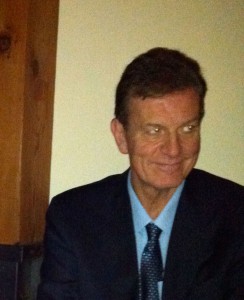Practicing what he preaches
Close to 10 years ago Simon Davis was looking for some Canadian-focused material for the social work class he teaches at UBC.
“I wanted an overview, an introduction to people who might end up working in the mental-health system,” says Simon, who has been the manager of the Grandview-Woodland Mental Health Team since 2005. “There wasn’t really a book that covered that off, at least in the Canadian context, that I could find anywhere. What I ended up doing was writing summaries of the literature, which the students found helpful and incorporating my own academic and professional experiences and what the students seemed to appreciate – pulling together a useful package that didn’t exist.”
In 2006, this “useful package” was published as a textbook called Community Mental Health in Canada, a resource for students across the country looking at getting into mental health.
Rooted in real experiences
“The book is definitely informed by my practical experiences at Grandview Woodlands and I’ve been privileged to have that,” he says from his office at the Robert & Lily Lee Family Community Health Centre. “What I try to explore in the book is the concept used by educators called knowledge exchange or knowledge translation – it’s applying theoretical knowledge and best practices to real-world settings.”
“I thought it was important for the reader to understand not only the theory about the interventions, but the challenges of applying them and I got that from my own work experience.”
Value to students
He says the feedback from his students at UBC’s School of Social Work has been really rewarding.
“I have had students tell me that they’ve used the book and found it very helpful for them,” he says. “That feedback is very gratifying for sure.”
“Several have said that there’s not anything else out there in the field like this,” he adds, “ which doesn’t necessarily make it a great book, but I think it’s been able to fill a gap, which is great.”
Recently, a second, expanded and updated edition of Simon’s book was released – a version he began working on almost immediately after the first edition came out.
“I knew almost immediately I wanted to make it better,” he says with a laugh. “And I’m really happy I had the chance to do that.”


